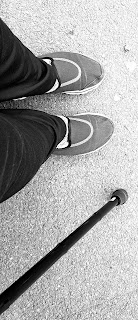Do I Identify as Disabled?
 |
| My Third Leg Credit: C King |
Feeling and being disabled are sometimes separate things. Four years ago, I gave a talk about MS to my department. I remember telling my colleagues that whilst I recognised MS as a disability, I didn't feel disabled. As you can imagine, this different perspective opened a few eyes.
Fast forward a couple of years, when symptoms have crept up in a way they never have before, and I would most definitely identify as disabled. A week ago, I asked my Twitter family whether they followed the identity-first language of 'disabled people' or person-first language of 'person with disabilities.' As I suspected, the results were mixed, very much in the way I had felt when speaking to my colleagues a few years ago.
I've lived with MS for nearly fourteen years (diagnosed for ten). What makes me feel disabled? What's changed?
My symptoms are impacting my daily activities. I've had to take a career break so that I can focus on my health. Among other things, I can no longer stand for great lengths of time and am unable to walk long distances. My fatigue ebbs and flows, but when it ebbs it affects cognition, energy levels and sometimes speech. I am now dealing with symptoms that have stemmed from other symptoms, and they are now more evident than ever (age, duration of the condition, who knows?). My attitude towards my disability has had to change because circumstances have dictated it does.
When people think of disability, they first think of reduced mobility. However, this isn't true for many disabled people. As an example, whilst my gait and knees do account for slight reduced mobility (on occasion, I use a walking stick), it is my non visible symptoms that are most disabling.
Now I identify as disabled, I am more observant of other people's attitudes toward disability. I'm not just talking about the minority who think of disabled people as benefit scroungers or feel a sense of super-admiration via 'inspoporn' (as someone gleefully described it to me the other day), I'm also talking about ableism. I could talk about ableism all day, but I prefer to come from the point of view of others' lack of education, self awareness and thought, rather than having a combative 'them and us' approach, as I believe that there are lots of things that can be corrected through educating others, particularly around little known conditions like MS.
I often hear members of our community say that MS defines them. Rarely, I even hear people say they are grateful for their MS. There are also those that don't think MS defines them when this is a fraction of their whole selves. Just through this variance in attitude alone, you can see why identity is hugely important to those of us with disability or a chronic illness. How we identify our conditions to ourselves and to others is a deeply personal thing, as evidenced by there being no one way to describe how disabled people should connect with their disability.
Where do I stand? Well, I think of myself as disabled, but I don't think it is all of who I am. In context, symptoms don't affect me all of the time. Some are managed fairly easily, some are almost unnoticeable with adjustments, and some I am working on (hence taking time out) but am sure eventually will also be managed. Much of what I experience is sensory, and therefore non visible.
What should this tell you? You don't have to look disabled to be disabled. You don't have to have a condition to identify as disabled. You don't have to be disabled and feel disabled (in a wider sense). The only person who can dictate how you identify with your disability is you.
Now if you'll excuse me, I'm going to go and look at a particular pair of boots...
If you have enjoyed reading my blog and would like to be notified of new posts and information from other organisations, please follow me at https://www.facebook.com/myMSbullyandme

